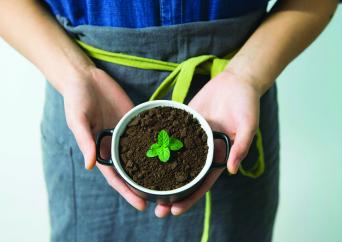
The Passionate Gardener: The Truth About Compost Tea
Every organic gardener knows compost. Grass clippings, spent stems and stalks, shredded leaves, kitchen scraps, all placed in a pile (or a composter) with the correct amount of moisture and, ultimately, you have compost. There is nothing better for your garden. As a fertilizer, soil amendment or mulch, plants love it.
In the early days of organic gardening, making “compost” tea usually involved putting some manure into a bucket of water, letting it steep and then feeding it to various plants. This concoction was actually manure tea, and is no longer recommended due to the possibility of contamination by pathogens in the unprocessed manure.
Today’s compost tea is an aerated solution that combines the beneficial microorganisms from compost with other nutrients. It is a concentrated liquid created by using a pump to circulate air through a compost solution, increasing the concentration of beneficial organisms. It requires a “brewer” to provide the ideal conditions for the microbes and organisms in the compost “food” to multiply. This solution can then be sprayed on your plants and soil for a variety of positive and beneficial effects.
Properly mixed and aerated compost tea contains large numbers of beneficial bacteria and other microbes that help produce healthier plants. It helps extend root systems and increases water and nutrient retention. The microorganisms assist in the breakdown of toxins in the soil and on the plants themselves. Compost tea cannot be over-applied as it is completely natural.
Be advised that compost tea is not a “silver bullet” for all the problems in your garden. For good results, you’ll need to continue other practices such as organic fertilizing, amending your soil, planting cover crops, mulching, irrigating and adding actual compost itself.
The technology of adding air, water and food to compost to make compost tea and using it to suppress disease is now about 15 years old. Soil microbiologist Elaine Ingham, founder of Soil Foodweb Inc. (www.soilfoodweb.com), reports repeated field trials on agricultural crops shows that compost tea does create and maintain an amazing combination of beneficial fungi, bacteria, protozoa and “good” nematodes.
Ingham uses compost tea in her own garden every spring and recommends using it at least once a month on not-so-healthy or brand-new, unestablished organic gardens.
Unfortunately, few scientific studies confirm the benefits of compost tea. Many gardeners say it doesn’t really work at all and that providing compost itself (without the “tea”) is all that is needed.
The University of Connecticut’s Soil Nutrient Analysis Laboratory states, “Although the art and science of using actively aerated compost tea (AACT) is still in its infancy, it may be well worth your time to investigate the use of compost tea in your yard. It may not solve all your disease problems but it seems likely to encourage overall plant health.”
If you would like to try brewing compost tea, I recommend “Keep It Simple Inc.” (866-558-0990, www.simplici-tea.com). This company provides the equipment and additives that I use in my own garden throughout the season.
For questions or comments: ron@primexgardencenter.com.

